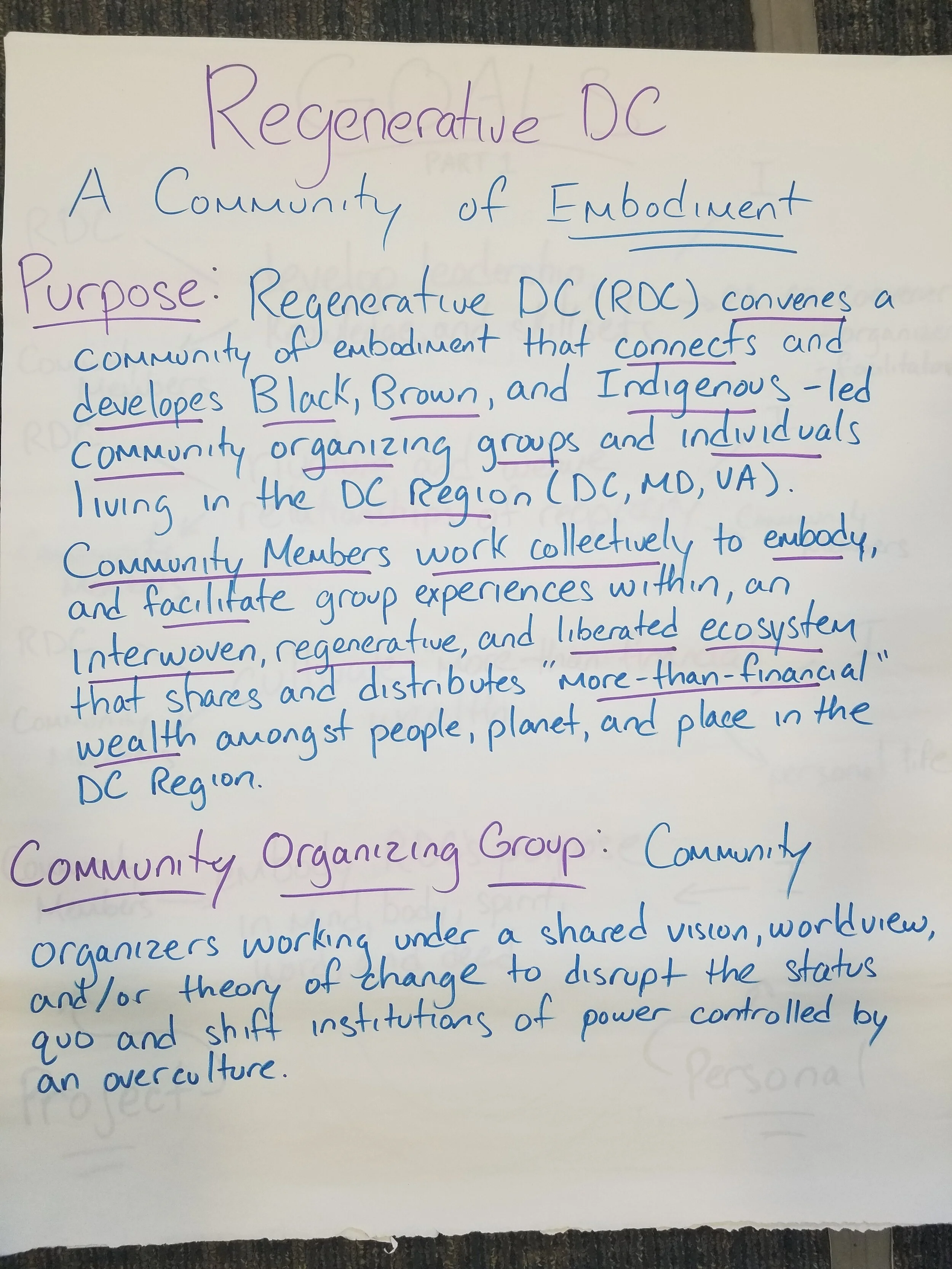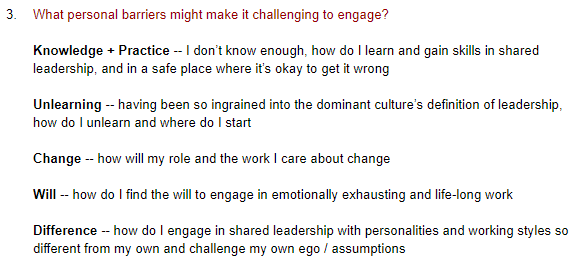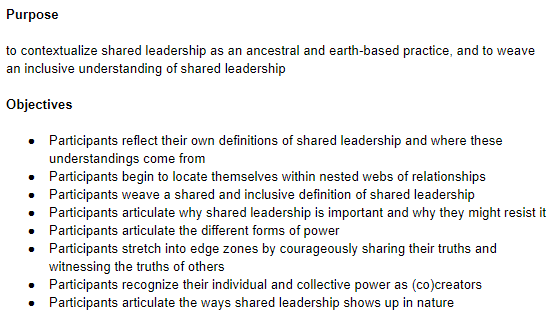social alchemy
song
resilient
spell-castings
principles & patterns of nature
co-governing our household
democratizing the workplace
resilient
“I got my roots down, down, down, down, down, down, down, down, down, deep
I got my roots down, down, down, down, down, down, down, down, down, deep
So what are we doing here? What has been done? What are you gonna do about it when the world comes undone? My voice feels tiny and I’m sure so does yours
But put us all together we make a mighty roar”
…
What practices help to keep you resilient?
How are you sharing power, responsibility & nourishment with those around you?
What relationships can you nurture, strengthen, let go of, or heal?
principles & patterns of nature
> change makers tree <
> fractals <
“A fractal is a never-ending pattern. Fractals are infinitely complex patterns that are self-similar across different scales. They are created by repeating a simple process over and over in an ongoing feedback loop. [...]
There is a structural echo that suggests two things: one, that there are shapes and patterns fundamental to our universe, and two, that what we practice at a small scale can reverberate to the largest scale. […]
Grace Lee Boggs articulated it in what might be the most-used quote of my life: ‘Transform yourself to transform the world.’ This doesn’t mean to get lost in the self, but rather to see our own lives and work and relationships as a front line, a first place we can practice justice, liberation, and alignment with each other and the Planet. [...]
Fractal strategies suggests wholeness in [ourselves] yields wholeness in our future.”
> reflections during the institute for mindful agriculture’s winter soil conference <
…inner soil…
We are in a time of immense transition… what does it feel like in the body? At times, it feels urgent. While some amount of urgency can be useful, I think to always be in a state of stress is to be unwell. How do we take the time to rest and to heal: our minds, bodies, spirit, relationships, and the land?
What am I here this weekend to receive? What am I here to offer? This weekend, I hope to receive love and connection, which is also what I hope to offer.
…ecological soil…
What is soil? What do our senses tell us? What is regenerative soil? Soil is life. We’ve just learned about the richness of the Nile Valley region. I believe it was divine energy that created that soil, and all soil. Both through a lens of western science, and as intuitive, spiritual, and earth-based beings, we can understand that this substance is vital for us, and everything, to exist. It’s a physical manifestation of the spiritual energy and consciousness swirling around us and through us.
How might we be in relationship with soils around us? We can be in relationship through our food. We can be in relationship by spending time outside. We can be in relationship by removing our shoes and rooting in. We can be in relationship by partnering with soil to generate more. I can be in relationship through the abundance of plant friends I encounter and present to my altar. I can be in relationship through play, wonder, and creativity. I can be in relationship with those who steward the land around me.
…social soil…
How can we build regenerative social soils?
By decolonizing
Through fractals!
By localizing our use and sharing of resources
Through our diversity
By sharing power and leading together
Through knowledge weaving
By engaging honestly and compassionately in conflict
Through hugs <3
> defining & decolonizing social permaculture <
“Permaculture is a practice of mimicking the patterns and principles found in nature and applying them to the design of systems that serve people while regenerating the land, rather than extracting from it. [...]
Social permaculture means many things to different people. To me, it is a healing art practiced by culture workers — people who are dedicated to transforming the broad-scale systems they are embedded in towards greater wholeness and regeneration — in service to a coordinated culture shift. [...]
It’s important to note that the co-founders of permaculture, Bill Mollison and David Holmgren, two white Australian male academics, did not just invent the land-based techniques of permaculture in the 1970s. These practices had been developed over millennia, mostly by Indigenous Peoples. By naming ‘the shoulders we stand on,’ as my social permaculture colleague Lisa DePiano says at the beginning of permaculture courses, we acknowledge these histories and resist practices of appropriating the knowledge of Indigenous Peoples. Today, there is a nascent but growing movement to ‘decolonize’ permaculture.”
> social design lab <
“In the Social Design Lab, you learn to apply the Regenerative Design Process to the development of a new project or the deepening of an existing project. Choose an idea for a social change project that serves a clear group of beneficiaries. The idea could be connected to one or more organization, institution, and/or community that you wish to create change within.”
> 1 <
co-governing our household
> living well together <
> community aspirations <
We were offered these community aspirations during the four-week Ecological Literacy Immersion Program:
Love and Curiosity
Be Present
Relational before Transactional
Examine Assumptions
Avoid Universal “We” Statements and Micro-Agressions
Move Up, Move Back
Assume Good Intent, Tend to Impact
Commit to and Act on Self-Care
Lean into Tension
Engage with Difference and Hard Stories
Accept and Expect Non-Closure
> collective meal planning <
> stewarding house systems & tasks <
> 2 <
democratizing the workplace
[place corps collaboration with good work institute
by jordan williams & lila rimalovski ]
> context <
Our shared experiences at Place Corps have positioned us to dive deep into the process of organizational culture-shifting. We know intimately the ills of the ‘overculture’ and are actively seeking to root ourselves in communities and spaces committed to paradigm-shifting and collectively-liberating work. Out of all of the focus areas we’ve explored in the past six months, we continually return to the value of cooperative leadership as a key element of whole-system transformation. Without rooting systemic change in shared power and collective decision-making, the same oppressive and extractive paradigms will be reified again and again.
Good Work Institute (GWI), founded in 2015, is a worker self-directed nonprofit (WSDNP) rooted in Kingston, New York. With a local and bio-regional focus, GWI aims to catalyze a regenerative “just transition” movement throughout the Hudson Valley. Movement Generation’s Just Transition Framework offers guidance to place-based groups and organizations working to advance system change at all levels of society. One of GWI’s core principles for manifesting a just transition is the “democratization of communities, wealth, and the workplace,” and in 2019, GWI transitioned into a WSDNP. As such, GWI offers a fertile social and organizational landscape to practice and manifest the values of shared power and collective decision making we’ve been growing at Place Corps.
Our initial research and lived experience suggests there’s a growing pool of folks and organizations committed to sharing practices around cooperative leadership and governance in the Hudson Valley bio-region. It also seems that much of the cooperative work underway is siloed into specific focus areas: community land trusts, food co-ops, lending circles, time-banks, etc. While all of these models are extremely powerful and necessary, GWI distinguishes itself not only by embodying cooperative leadership as a WSDNP, but also by weaving together and resourcing and a wide variety of folks (beyond the boundaries of one industry) with the tools needed to operate cooperatively, equitably, and regionally.
Through its recent leadership transition and mission realignment with the Just Transition Framework, GWI has woven itself into a growing mycelial and relational web of organizations committed to supporting each other through this deep work. The fractals here are noteworthy -- GWI embodies cooperative power in its internal structure, in its regional network, and in the larger fabric of Just Transition accomplices.
After initial conversations with the GWI team, we’ve identified a list of core projects that would allow a reciprocal exchange of learning, skill building, mentorship, and community for us, and increased capacity within GWI to educate, connect, and catalyze cooperative leadership and organizations in the Hudson Valley:
conduct interviews of organizational staff and change makers in Kingston, NY interested in democratizing their workplaces, and
design workshop materials and activities corresponding to the needs and desires synthesized from these interviews.















